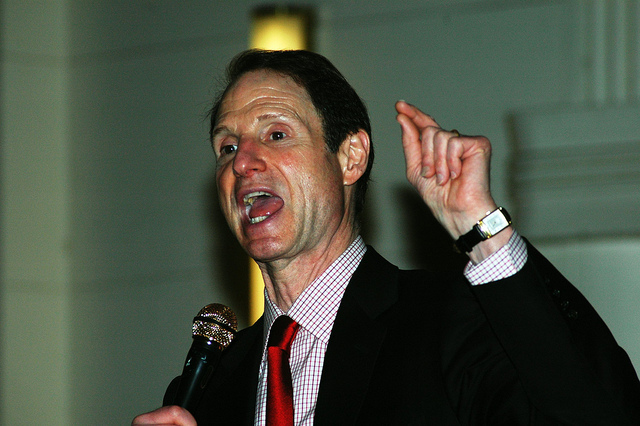
Earlier this week we covered a new white paper from the New America Foundation arguing the recent proliferation of data caps instituted by broadband providers are designed to maximize revenue rather than minimize congestion. The issue caught the attention of Sen. Ron Wyden (D-OR), who introduced legislation to regulate the use of data caps on Thursday.
"Data caps create challenges for consumers and run the risk of undermining innovation in the digital economy if they are imposed bluntly and not designed to truly manage network congestion," Wyden said in an e-mail statement.
Wyden hopes to address three issues with his proposal. First, he wants to increase the amount and accuracy of information provided to consumers. His bill empowers the Federal Communications Commission to regulate ISPs' methods for measuring bandwidth usage with an eye to improving their accuracy. And it requires ISPs to provide their customers with realtime tools for tracking their usage and comparing them with the ISP's established caps.
Second, the bill requires that any data caps employed by ISPs function to "reasonably limit network congestion without unnecessarily restricting Internet use." According to a statement released with the legislation, "some data caps are so blunt that they may work to discourage Internet use even when doing so has no bearing on network congestion."
The most ambitious part of the legislation is a kind of network neutrality rule. It requires that any data cap (which is defined to include metering schemes) not be used to "provide preferential treatment of data that is based on the source or content of the data." That would ban a practice that is frequently mentioned by advocates of network neutrality regulation: the creation of a paid "fast lane." For example, earlier this year critics charged that Comcast's practice of not counting traffic generated by its own video streaming app for the Xbox violated network neutrality. Comcast has since suspended enforcement of its data caps, but if Wyden's bill passes, the cable giant could be forced to scrap the XBox exemption altogether.
"Future innovation will undoubtedly require consumers to use more and more data—data caps should not impede this innovation and the jobs it creates," Wyden said. "This bill is intended to help consumers manage their data more effectively and ensure that data caps are used only to serve the legitimate purpose of addressing congestion."
The legislation enjoys the support of Public Knowledge, a liberal advocacy group that has long criticized the use of data caps. "Data caps create an artificial scarcity in the broadband market that limits consumer choice and hinders the creation of new competitive content online," said the organization's Christopher Lewis. "Public Knowledge supports Sen. Wyden's effort to provide consumers with transparency on their data usage and to ensure that these caps do not limit innovative products and uses on the Internet."
"Discredited economic thinking"
Ryan Radia of the libertarian Competitive Enterprise Institute was less enthusiastic about Wyden's proposal. He believes that data caps can serve useful purposes beyond congestion control. "Setting prices based on demand, rather than on unit cost, is a beneficial business practice that's commonplace in network industries," he told Ars by e-mail.
He drew an analogy to the airline industry. "While the cost of filling an empty plane seat at the last minute is minimal, airlines often charge extra for such seats, due to last-minute flyers' higher willingness to pay." In this way, he said, metered broadband can promote fairness by encouraging "voracious Internet users to pay more than lighter users." In his view, the Wyden proposal "amounts to a price control based on discredited economic thinking."
Radia's colleague Fred Campbell agreed, and he argued that "bandwidth-hungry video advertisements" contributed to network congestion. "If Senator Wyden wants to promote consumer control over data usage, he should start with a law governing the practices of search engines, websites, and application providers," he told us by email.
Radia's view is likely to be well-represented in Congress. Last year, House Speaker John Boehner (R-OH) pledged to oppose network neutrality regulations. The Republicans who control the House of Representatives may be similarly skeptical of Wyden's proposal.
reader comments
144